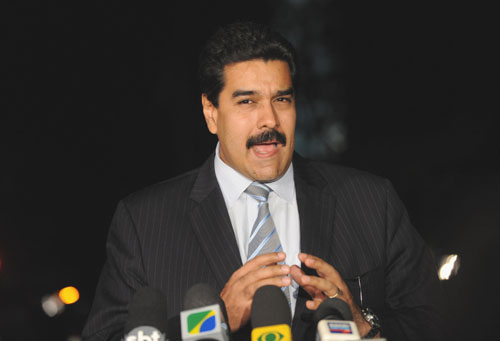by WorldTribune Staff, March 31, 2020
A pair of boastful “narconephews” may ultimately bring down a socialist dictator who seemed all but impervious to the powerful domestic and foreign forces lined up against him.
Nicolas Maduro has managed to remain in power despite economic and humanitarian catastrophe in Venezuela. The United States has imposed crippling sanctions. Most Western nations have called for Maduro’s ouster and support opposition leader Juan Guaido as the true leader of Venezuela.

Yet Maduro survived.
Then, along came the “narcosobrinos” — or “narconephews.”
Much earlier, at a secret meeting in Honduras in the fall of 2015, Maduro’s nephews — novice drug dealers Efrain Campo, 29, and his cousin Franqui Flores, 30 — bragged to a Mexican cartel chief, who turned out to be a DEA informant, about their influence with their uncle, Isabel Vincent noted in a March 28 report for the New York Post.
The nephews’ boast kicked off an investigation which exposed the rank corruption of Maduro’s regime and culminated in last week’s federal indictment in New York which charged Maduro and members of his inner circle with drug trafficking and “narco-terrorism.” The U.S. has issued a $15 million reward for information leading to Maduro’s capture.
In the fall of 2015, Maduro’s nephews were planning their first drug shipment to the U.S.: 800 kilos of cocaine worth more than $20 million that they would transport on a private plane from Simon Bolivar International Airport in Caracas, Vincent’s report said.
“How would they get such a huge shipment — nearly a metric ton — through the busy airport, asked the incredulous Mexican dealer, a secret informant for the U.S. Drug Enforcement Administration, who had spent weeks helping the federal agency lay a trap for the young men,” Vincent wrote.
“Although they knew that seasoned drug traffickers used clandestine jungle landing strips to load cocaine onto small planes, the cousins boasted of their unfettered access to Terminal Four at the Simon Bolivar International Airport.
“In the end it was the boast about Maduro’s private airport hangar that would seal their fate,” Vincent wrote.
Maduro inherited Venezuela’s narco-state from his predecessor Hugo Chavez.
“The hundreds of millions of dollars they earned from cocaine trafficking was an easy way to ensure a steady stream of much-needed cash into a country where failed Marxist policies, such as government control of the economy, would begin to fuel runaway inflation and lead to widespread shortages and poverty for millions of Venezuelans,” Vincent wrote.
U.S. sanctions, “which effectively acted as an embargo isolating Venezuela economically, plunged Maduro even further into the drug trade,” Vincent wrote. “Set against falling oil prices in the oil-rich Andean country, Maduro had to get even more creative to earn cash. In the last few years, he has resorted to selling tons of Venezuela’s federal gold reserves as well as gold from illegal mining ventures, spiriting bricks of the precious metal onto private charter aircraft for flights to Istanbul, ultimately destined for sale to European banks.”
In his bid to hold on to power, Maduro “recruited his own family members to the cartel,” Vincent wrote. “When Franqui and Efrain were caught on a fueling stop in Haiti with their planeload of cocaine in Nov. 2015, they immediately confessed to their DEA captors that they needed to raise money for the congressional campaign of their aunt, Cilia Flores, the first lady of Venezuela.”
“We need the money,” said one of Flores’ nephews as they were flown to Westchester County Airport in White Plains after they were captured in Haiti, court papers say. “Why? Because the Americans are hitting us hard with money. Do you understand? The opposition is getting an infusion of a lot of money and so, it’s also us, that’s why we are at war with them.”
After their trial, the “narconephews” in 2017 were sentenced to 18 years in Florida prisons.
Intelligence Brief __________ Replace The Media
